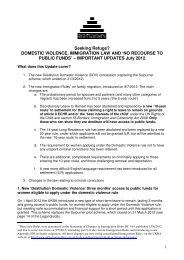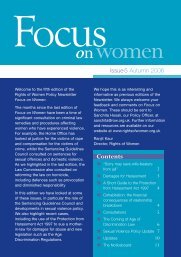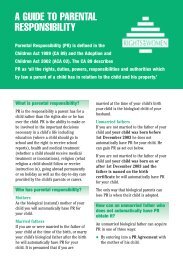Seeking Refuge? - Rights of Women
Seeking Refuge? - Rights of Women
Seeking Refuge? - Rights of Women
Create successful ePaper yourself
Turn your PDF publications into a flip-book with our unique Google optimized e-Paper software.
The case-owner may decide that you are not<br />
entitled to <strong>Refuge</strong>e Leave, and instead give you<br />
another form <strong>of</strong> protection, for example<br />
Humanitarian Protection or Discretionary Leave.<br />
Alternatively, the case-owner may decide that you<br />
are not entitled to any form <strong>of</strong> protection and<br />
refuse your application.<br />
You may be able to appeal against a decision to<br />
refuse you protection, or to give you a form <strong>of</strong><br />
protection that is different to what you applied<br />
for, to the Asylum and Immigration Tribunal<br />
(the AIT). You should seek legal advice from your<br />
legal representative on whether or not you can<br />
appeal against a decision.<br />
Appealing to the Asylum and<br />
Immigration Tribunal<br />
Appeals against initial decisions are heard by<br />
Immigration Judges in the AIT who may be<br />
accompanied by non-legal members <strong>of</strong> the<br />
tribunal. Immigration Judges and non-legal<br />
members are independent <strong>of</strong> the UK Border<br />
Agency and the Home Office.<br />
As the person appealing against the decision, you<br />
will be referred to as the appellant while the<br />
Home Office is the respondent. You are both<br />
parties to the proceedings, which are controlled<br />
by the Immigration Judge. The hearing is the<br />
investigation that takes place before an<br />
Immigration Judge at the AIT, to decide whether<br />
or not you are entitled to protection in the UK.<br />
Decisions in appeals are given in writing and<br />
called determinations. The Immigration Judge<br />
will decide whether the appeal against the<br />
decision is successful or not. This is known as the<br />
decision being allowed or dismissed.<br />
You can find out more about the AIT by<br />
visiting their website: www.ait.gov.uk<br />
The rules setting out the procedure for<br />
appeals are the Asylum and Immigration<br />
Tribunal (Procedure) Rules 2005 you can<br />
read them here: www.opsi.gov.uk/si/<br />
si2005/20050230.htm<br />
The purpose <strong>of</strong> the Procedure Rules is to<br />
ensure that appeals are dealt with as “fairly,<br />
quickly and efficiently as possible” (Rule 4).<br />
What are my chances <strong>of</strong> success<br />
on appeal?<br />
Your legal representative will be able to advise you<br />
on the strengths and weaknesses <strong>of</strong> your case on<br />
appeal.<br />
However, many people whose applications are<br />
refused initially by the UK Border Agency are<br />
given a form <strong>of</strong> protection on appeal. For<br />
example, in the last three months <strong>of</strong> 2008, 70%<br />
<strong>of</strong> applications decided by the UK Border Agency<br />
under the New Asylum Model were refused. 19%<br />
<strong>of</strong> applicants were given <strong>Refuge</strong>e Leave and 11%<br />
were granted Humanitarian Protection or<br />
Discretionary Leave. Of those who appealed<br />
against a refusal to the AIT, 25% were<br />
successful 25 .<br />
How do I appeal to the Asylum<br />
and Immigration Tribunal?<br />
The letter from the UK Border Agency that sets<br />
out their decision to refuse you protection will<br />
include information about how you can appeal<br />
against the decision and a form to enable you to<br />
do this.<br />
People who are represented at their appeals by a<br />
qualified solicitor, barrister or immigration<br />
representative have a much better chance <strong>of</strong><br />
being successful in their appeal than those who<br />
do not. As soon as you receive your decision from<br />
the UK Border Agency you should get legal advice<br />
on what it means and how to appeal. The AIT is<br />
unlikely to postpone (put back) your appeal<br />
because you have not found legal representation<br />
in time.<br />
The appeal form must be completed in full and<br />
sent to the AIT within 10 working days <strong>of</strong> the<br />
date <strong>of</strong> the refusal decision letter. If you are in<br />
detention or have to appeal your decision from<br />
outside <strong>of</strong> the UK, different time limits apply (see<br />
below). You must also include the Home Office<br />
decision letter with the completed notice <strong>of</strong><br />
appeal. Your legal representative will complete the<br />
notice <strong>of</strong> appeal for you and ensure that the<br />
correct procedure for appealing against the<br />
decision is followed.<br />
46
















